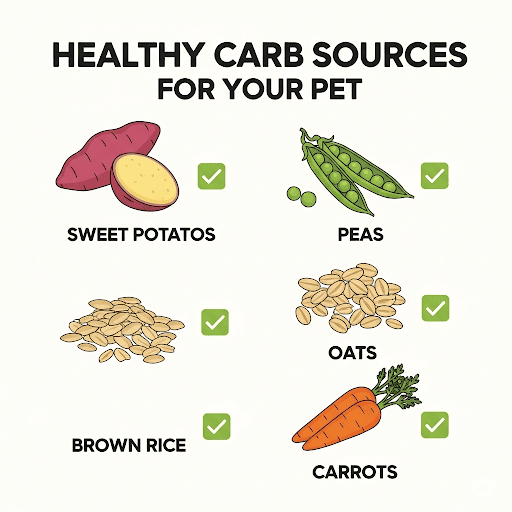Walk down any pet food aisle, and you’ll be bombarded with bold claims: "Grain-Free," "Low-Carb," "Ancestral Diet." In the modern world of pet nutrition, no nutrient is more debated, more controversial, or more confusing to pet parents than the carbohydrate.
This intense marketing focus has left many loving owners with pressing questions: Are carbs just cheap, empty "fillers"? Do they contribute to weight gain? Is a carb-free diet the key to my pet's health? It's time to cut through the noise. Let's uncover the science and deliver a balanced verdict on whether carbs are friend or foe in your pet's bowl.
The True Purpose of Carbohydrates in Pet Food
The most common myth about carbohydrates is that they are simply "fillers"—cheap ingredients used to bulk up food without providing value. This is a fundamental misunderstanding of their role. High-quality carbohydrates in pet food serve several important functions.
First and foremost, they are a source of readily available energy. When digested, carbohydrates are broken down into glucose, which fuels cells throughout the body. By providing this energy, carbs have a "protein-sparing" effect. This means the body can use its dietary protein for its most important jobs—building and repairing tissues, supporting the immune system, and creating hormones—instead of burning it for energy.
Furthermore, certain types of carbohydrates are essential for gut health. Dietary fiber, for example, is a complex carb that helps regulate the digestive system, ensure proper stool quality, and acts as a prebiotic, feeding the beneficial bacteria that live in your pet's gut. Finally, the extrusion process used to make dry kibble requires starches (a type of carb) to bind the ingredients and form the familiar crunchy shape.
The Dog vs. Cat Carb Conundrum
The most critical factor in the carbohydrate debate is the species you are feeding. The needs of a dog and a cat are worlds apart.
For Dogs (Adaptable Omnivores): Over thousands of years of domestication alongside humans, dogs have evolved genetic adaptations that allow them to efficiently digest and utilize starches. For the vast majority of dogs, complex carbohydrates from sources like sweet potatoes, oats, and brown rice are an excellent and easily metabolized energy source. The question, are carbs bad for dogs, is generally no—provided they are high-quality and part of a balanced diet.
For Cats (Obligate Carnivores): The answer is very different here. Cats are true carnivores, meaning their bodies are optimized to derive energy from protein and fat. The question, do cats need carbohydrates, has a clear answer: No, they have no minimum dietary requirement for them. While they can use carbs for energy, their natural diet is extremely low in them, and their metabolism is not designed to handle a high-carb load. Diets high in carbohydrates can contribute to obesity and other health issues in felines.
Understanding this fundamental difference is key. Our pet meal planner app automatically adjusts the macronutrient profile based on whether you're building a plan for a dog or a cat, ensuring your feline friend gets the high-protein, low-carb diet they are biologically designed for, while your canine companion gets a balanced blend of energy sources.
It's About Quality, Not Just Absence
The "grain-free" movement has incorrectly taught many to see all carbs as a single evil entity. In reality, the quality and type of carbohydrate are far more important than its mere presence.
Grain-free diets don't eliminate carbs; they simply swap grains like corn and rice for other sources like potatoes, peas, and lentils. A poorly formulated grain-free diet can be much higher in carbohydrates and lower in nutritional value than a high-quality, grain-inclusive diet. The focus shouldn't be on a single ingredient but on the overall balance of the formula. Complex carbs that provide sustained energy and fiber are far more beneficial than simple sugars or highly refined starches.
(The grain-free debate is complex. We break it down further in our article [Grain-Free Labels: What Are They Replacing Grains With?].)

Conclusion: A Balanced Verdict on Carbs
So, are carbohydrates friend or foe? The answer is: it depends. They are not the dietary villain they are often portrayed as. For dogs, quality carbohydrates are a beneficial friend, providing essential energy and fiber. For cats, they are a nutrient that should be minimized in favor of the protein and fat they are built to thrive on.
Ultimately, the goal is not to demonize one nutrient group but to create a complete and balanced diet tailored to your pet's individual needs.
Feeling more confident about carbs in your pet's bowl? The best diet is always one created specifically for your pet. Discuss their unique energy requirements with your veterinarian, and use our meal planner to build a perfectly balanced recipe that fuels their healthiest, happiest life.


